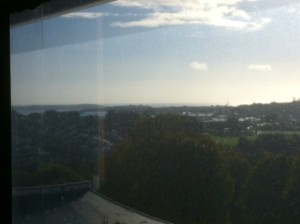This is the view which greets me at 9 am on Friday mornings. I teach academic skills workshops all day in a little room, Seminar B of the Daphne du Maurier building at the University of Exeter, Penryn Campus. It is tucked away from the other seminar rooms, and not on any map (apart from the fire exit plan – the way I first found my way to the classroom). The workshops cover the foundations of scholarly work: how to start researching texts and cite the relevant sources; the fundamentals of close reading and analysis; beginning archival and historical research; engaging with visual culture and performance. It can sound like dry work – struggling to understand the demands of an alien referencing system: where to put the commas, colons, and full-stops; the speechmarks and the italics – but, for me, it is a privilege to assist young adults’ first steps into a community of scholarship.
But let’s look at that view: the full-length windows of the Daphne du Maurier building offer a sweeping panorama over the campus, across Penryn, towards Falmouth and the sea. It is early morning, so only a trickle of students and staff flow between the Stannary refectory and the original Tremough House. This beautiful building dates back to the 1700s, and housed a Catholic convent school from 1943, before the university campus took over 10 years ago. The lush greenery of the Tremough gardens carries the eyes over to Penryn, a small town which has been flooded with new life from the overspill of students from the campus. Eclectic, bohemian, increasingly multicultural Falmouth lies beyond. The sea glimmers in the distance. This view takes in the business and busy-ness of a developing university campus, still intimate but more and more diverse; a small town transformed by its contact with the world of study; and an old, international seaport forging new connections with academia.
In Sir Arthur Quiller-Couch’s 1906 miscellany From a Cornish Window, the title of which inspires our mini-festival ‘From a Cornish Window: Individual, Landscape, Community’, he describes the view from his own window:
My window… looks out from a small library upon a small harbour frequented by ships of all nations—British, Danish, Swedish, Norwegian, Russian, French, German, Italian, with now and then an American or a Greek—and upon a shore which I love because it is my native country. Of all views I reckon that of a harbour the most fascinating and the most easeful, for it combines perpetual change with perpetual repose.
Quiller-Couch’s combination of a perspective rooted in locality, in love for his native country, with international reach – fascination with ease, change with repose – informs both the work of Penryn Campus, a world-class university in the heart of Cornwall, and our own view ‘from a Cornish Window’: a mini-festival forging connections between local institutions, the Royal Cornwall Museum in Truro and the Cornish Studies Library in Redruth, and an international community of scholars, thinking about our imaginative responses to living by the sea; our poetic connection to landscape; the familiar spaces of our homes and faces; and living amongst crowds in cities transformed beyond our understandings.



